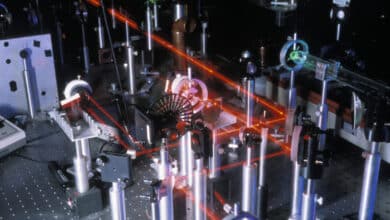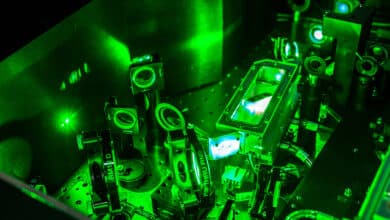All Quantum Computing Posts
-
Quantum Computing
Colliding Waves: How Quantum Interference Powers Quantum Computing
Quantum interference remains the cornerstone of quantum computing’s promise. It’s the feature that distinguishes quantum computation from just a random quantum jumble. A quantum computer is not powerful simply because it can have many states at once – if that were all, measuring would give a random one and it wouldn’t be useful. It’s powerful because those many states can interfere in a orchestrated way…
Read More » -
Quantum Computing
Understanding “Polynomial Time” – Why Faster Algorithms Matter
Quantum computing has emerged as a new frontier of great-power competition in the 21st century. Nations around the world view advanced quantum technologies as strategic assets—keys to future economic prowess, military strength, and technological sovereignty. Governments have already poured over $40 billion into quantum research and development globally, launching national initiatives and international collaborations to secure a lead in this critical domain.
Read More » -
Quantum Computing
Key Principles and Theorems in Quantum Computing and Networks
The landscape of quantum computing and quantum networks is an exciting frontier where physics and cybersecurity intersect. We’re witnessing the early days of this quantum revolution. As quantum hardware scales and quantum protocols move from labs to real-world deployment, security experts will need to collaborate with physicists like never before. By mastering concepts like Heisenberg’s uncertainty, Bell’s theorem, and the no-cloning rule, cybersecurity professionals equip…
Read More » -
Quantum Computing
Qubits: A Brief Introduction for Cybersecurity Professionals
A qubit is the quantum analog of a classical bit – it’s the basic unit of quantum information. However, unlike a classical bit that can only be 0 or 1 at any given time, a qubit can exist in a combination of both 0 and 1 states simultaneously. This property is called superposition.
Read More » -
Quantum Computing
Bell States: An Introduction for Cybersecurity Professionals
Bell states are a set of four specific quantum states of two qubits (quantum bits) that are entangled. In simple terms, an entangled pair of qubits behaves as one system, no matter how far apart they are. Bell states are the simplest and most extreme examples of this phenomenon. They are fundamental to quantum mechanics because they exhibit correlations between particles that have no classical…
Read More » -
Post-Quantum
Kuperberg’s Algorithm and its Impact on Post-Quantum Cryptography (PQC)
Kuperberg’s algorithm is an impressive quantum algorithmic achievement that expands the boundary of what quantum computers might do beyond the original realm of Shor’s algorithm. It demonstrates that even some non-trivial group problems (like the dihedral hidden subgroup problem) are easier for quantum computers than for classical ones, albeit not easy in an absolute sense. In the context of cryptography, Kuperberg’s result serves as a…
Read More » -
Quantum Computing
Balancing Quantum Computing Hype and Hope
Quantum computing stands at the intersection of immense promise and intense hype. As someone who had led cybersecurity teams (including serving as an interim CISO for Fortune 500 companies) and was now investing in a quantum computing startup, I found myself navigating two contrasting narratives. On one hand, I am bullish on the future of quantum technology - convinced that within 15-20 years we’d see…
Read More » -
Quantum Computing
Why I Chose Photonic Quantum Computing
Choosing photonic quantum computing for my startup is equal parts ambition and pragmatism. The ambition is that photons, with their long coherence and networking talent, could unlock scalable quantum computers without the cryogenic baggage of other approaches. The pragmatism was that by immersing myself in this cutting-edge field, I could better prepare for the quantum revolution that will shake up cybersecurity. Photonic qubits offer a…
Read More »
 ..." /> Topic: Quantum ComputingTopic: Quantum Computing Search forSearch for
..." /> Topic: Quantum ComputingTopic: Quantum Computing Search forSearch for 






